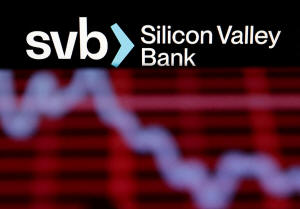Silicon Valley Bank deal offers beleaguered banking investors relief
 Send a link to a friend
Send a link to a friend
 [March 28, 2023] By
Susan Mathew, Amruta Khandekar and Pete Schroeder [March 28, 2023] By
Susan Mathew, Amruta Khandekar and Pete Schroeder
(Reuters) - Regional U.S. lender First Citizens BancShares scooped up
the assets of failed peer Silicon Valley Bank on Monday, in a vote of
confidence for the battered banking sector that prompted a rally in bank
shares.
SVB's collapse this month was the trigger for the worst banking shock
since the 2008 global financial crisis, sending bank stocks globally on
a wild ride and raising fears of systemic stress that could lead to more
bank failures.
But news of the SVB deal - after previous attempts to sell the bank
failed - and a weekend free of fresh troubles helped boost confidence,
especially among fragile U.S. regional banks, whose stocks rose sharply
on Wall Street on Monday.

Broader indicators of financial market stress were also calmer, with
government bond yields rising and the euro higher against the dollar.
"The banking sector had been holding its breath over the weekend,
wondering whether Monday morning would deliver another bank in need of a
rescue," said Danni Hewson, head of financial analysis at AJ Bell.
"Instead, nerves have been bathed in the soothing balm of certainty as
one of America’s largest family banks gobbled up a chunk of Silicon
Valley Bank, wiping the name from America’s streets and hopefully from
the front of investors’ minds."
First Citizens BancShares Inc, which has built a reputation of buying
troubled rivals, bought all of SVB's loans and deposits, giving the
Federal Deposit Insurance Corp (FDIC) equity rights in its stock worth
as much as $500 million in return.
First Citizens said it would take on assets of $110 billion, deposits of
$56 billion and loans of $72 billion, and expand in California. The FDIC
retains some $90 billion in securities held for disposal.
"We see the sale of SVB to a regional bank as politically helpful to the
banks. It allows the industry to argue that large regionals can be
resolved without help from the mega banks," said analysts at TD Cowen.

Shares of First Citizens, which also has an agreement to share some
potential losses with the regulator, soared 53.7% on Monday.
SOLID FOOTING
Top U.S. banking regulators plan to tell Congress that they will
comprehensively review their policies in a bid to prevent future
collapses and signaled that new bank rules are in the works - such as
tightening up requirements for larger regional banks and how to police
heavy reliance on uninsured deposits.
Fed Vice Chair for Supervision Michael Barr and Federal Deposit
Insurance Corporation Chairman Martin Gruenberg - who are due to speak
at a Senate hearing on Tuesday - will also echo other policymakers in
emphasizing that the overall financial system remains on solid footing.
The White House also reiterated its reassurances on banks, saying the
U.S. banking system is safe.

[to top of second column] |

SVB (Silicon Valley Bank) logo and
decreasing stock graph are seen in this illustration taken March 19,
2023. REUTERS/Dado Ruvic/Illustration/

The collapse of SVB and New York-based peer Signature Bank has left
politicians wary of public perceptions that banks are being bailed
out again, after anger over the sector's costly rescue in 2008.
The FDIC estimates SVB's failure will cost a federal deposit
insurance fund used to rescue banks about $20 billion. The fund does
not take U.S. taxpayer money and is instead replenished by a levy on
the entire banking sector.
Signature's failure cost the FDIC $2.5 billion but had no other
direct cost to taxpayers outside of the FDIC, Wells Fargo analysts
wrote.
"The bottom line is that the 2nd and 3rd largest bank failures are
now resolved," Wells Fargo analysts said.
BUYING TIME
The First Citizens deal boosted shares of other smaller regional
banks, including First Republic, which has been at the forefront of
investors' minds. Its shares jumped almost 12%.
Regional peers Western Alliance Bancorp and PacWest Bancorp each
climbed more than 3%. Major U.S. banks JPMorgan Chase & Co,
Citigroup and Bank of America advanced between 2.9% and 5%.

Banking stocks in Europe also rebounded after a shaky previous
session. Germany's biggest lender Deutsche Bank, which had slumped
8.5% on Friday alongside a sharp jump in the cost of insuring its
bonds against default, rose 6.2%.
The Stoxx index of top European bank shares is still down more than
17% this month, however, and the U.S. KBW regional bank index has
lost 20%, as investors remain on edge about what is next.
The banking tumult has prompted investors to question whether major
central banks will continue to pursue aggressive interest rate hikes
to tamp down inflation, and whether tightened lending will hurt the
global economy.
But Bank of England Governor Andrew Bailey signalled that interest
rate-setters would continue to focus on fighting inflation and would
not be swayed unduly by worries about the health of the global
banking system.
Even before the present crisis erupted, bank lending to euro zone
companies had slowed for the fourth straight month in February,
signalling increased caution from lenders.
In the United States, flows into less risky money market funds have
risen by more than $300 billion in the past month to a record atop
$5.1 trillion.

(Reporting by Susan Mathew and Amruta Khandekar in Bengaluru and
Pete Schroeder in Washington; Additional reporting by Maria
Ponnezhath in Bengaluru, Anirban Sen in New Orleans, Joice Alves in
London and Renju Hose in Sydney and Noel Randewich in Oakland,
California; Writing by Tom Westbrook, Toby Chopra and Deepa
Babington; Editing by Nick Zieminski and Matthew Lewis)
[© 2023 Thomson Reuters. All rights
reserved.]
This material may not be published,
broadcast, rewritten or redistributed.
Thompson Reuters is solely responsible for this content. |